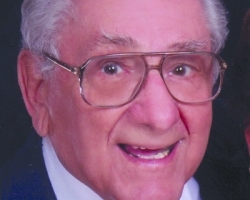Some column readers have asked me to write about “wartime living conditions.” “Living” could be the key-word, “survival” may be more appropriate. True, living in a barracks, and sleeping on a mattress on the upper or lower part of a bunk bed was just fine during Basic Training in 1943. But in mid-August, our 938TH Field Artillery battalion boarded a converted Italian luxury liner, but expecting it to be “luxurious” was a true disappointment.
First, as a troop ship, it was rigged up to carry 6,000 men but we had over 8,000 on board. Our battalion was assigned to “B-deck” (two levels below sea level). Our sleep arrangement was a series of “hammocks;” one on top of the others, with barely enough space between each to turn your body while in a prone position. Air-conditioning was minimal so our bodies were bathed in sweat all night. I got very lucky on the second morning. While standing in the chow-line for breakfast, I saw a former schoolmate who was one of the Navy men doling out the food.
When I said “Hi Steve,” he recognized me. He whispered, “Meet me on the “poop-deck tonight at 10 … and bring your bunk-roll.” Not knowing what to expect, I was there just before 10 p.m. with all my gear. Steve arrived with some foods left over from “OFFICERS-MESS” which included a hunk of steak, a baked potato, some oatmeal cookies, AND a slice of apple pie. Imagine my surprise … and delight.
This evening dining event continued over the next 19 days. Each night, I spread out my bunk-roll and crawled in to sleep ON deck staring at a dark sky filled with millions of sparkling stars. I had never seen such a clear sky with so many stars. Of course, I had to awaken every morning before 6 a.m. before the sailors came by, swabbing the decks. I quickly rolled up my bedroll and hid all my gear in a lifeboat. Our 60-ship convoy zig-zagged across the Atlantic Ocean.11
The reason for this non-direct maneuver was to avoid being hit broadside by enemy torpedoes, especially along the coast near Spain and Portugal known as “Torpedo Junction” where many German submarines had already sunk many Allied ships.
As luck would have it, that is exactly where one boiler on our ship blew-up (exploded) and three sailors were killed. This left our ship alone, in “Torpedo Junction” like a lame, sick duck. All the other 59 ships of our convoy sailed on without us. Somehow, by late morning, something got fixed and we were able to sail again, however, a brief funeral ceremony was conducted by the ship’s Captain. We all stood at “Attention” while a bugler played “TAPS.” A “makeshift casket” containing the bodies of the dead sailors and heavily weighted and tied with chains and heavy metal pieces, was pushed overboard, to sink to the bottom of the ocean … a real burial-at-sea. These three men were the first of all the casualties I saw during my three years of service.
Our ship sailed ahead as fast it could go, in a straight path, to catch up with our convoy without the proper “zig-zagging.” About 10 hours later we caught up. It was a wonderful sight to see, especially watching sailors on various ships using their semaphore flags to send their messages. As our ship approached other ships, they moved in a manner to open a space in the convoy, where in a matter of four hours we sailed into our original position in the convoy. Fortunately all the enemy U-BOATS were elsewhere. We passed by The Rock of Gibraltar and arrived to disembark in Oran, Algeria in North Africa. After a brief stay there, we rode around the Atlas Mountain as we climbed toward the top that was quite an interesting ride. As we came around the south of the Atlas Mountain we could feel the nearly unbearable heat from the Sahara Desert, and from the north side, the cool breeze from the Mediterranean Sea.
We eventually arrived just outside of Tunis. We saw evidence of great battles everywhere; especially severely/damaged tanks and trucks. Our Allies had fought Field Marshal Rommel, one of the German’s greatest warriors, and defeated him and his tank corps as they fled toward Egypt.
Next, we were scheduled to sail over to Salerno, but there was a mix-up in our convoys. Ours was pulled back away from the port and replaced by our “sister-unit, the 939th.”
Meanwhile, we sailed into the port of Naples, Italy. Still aboard ship, we were “greeted” by two German fighter planes that strafed everything in sight. Most of our men were still below deck and suffered no casualties. When we came on deck, many students motioned for us to follow them into the basement of a nearby college building that was designated as a “Bomb Shelter.
We heard and felt the effects of bombs exploding outside. We learned later, the battles on Salerno were devastating to all combatants.
More ‘Wartime Living Conditions” will be reported in future columns.
Bill Thomas of Rossmoor is a Veteran of World War II, and Past Commander of VFW Post 4048, and American Legion Post 857. Contact Bill at vvbthomasvets@gmail.com.










